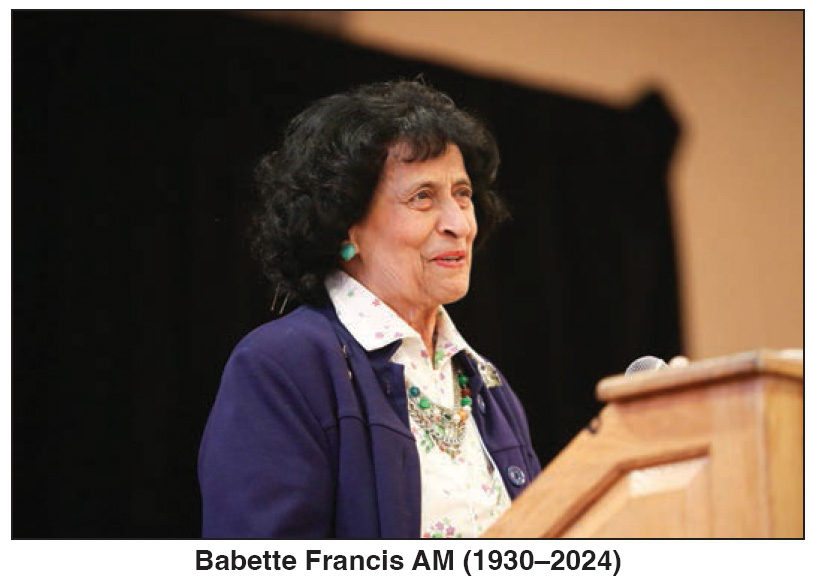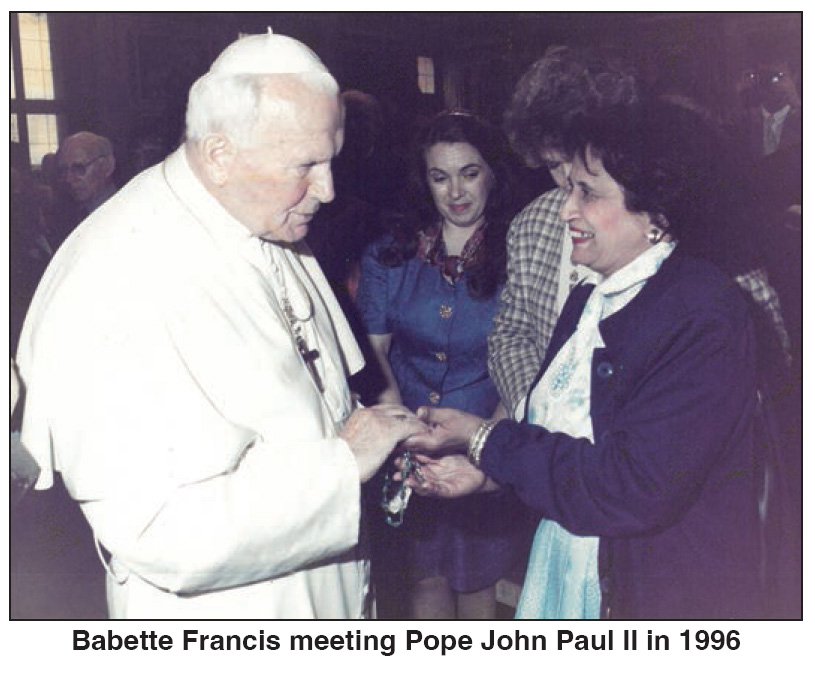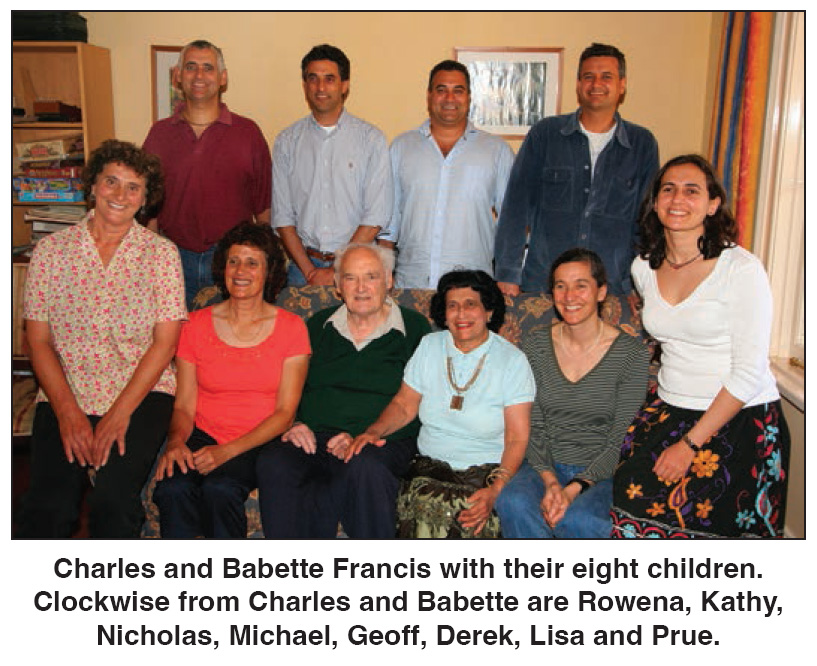Eulogy for Babette Avita Francis AM by Prue Francis AM
A Requiem Mass for Mrs Babette Avita Francis AM (1930–2024) was held at St Joseph's Catholic Church, 47 Stanhope Street, Malvern, Victoria 3144, Australia, on Friday morning, August 2, 2024. The following eulogy was delivered by her daughter, Dr Prue Francis AM.
 Thank you all for being here, including those viewing the webcast, to join us in celebrating the wonderful life of my mother Babette. There are many different dimensions to her life: family was foremost and fundamental; but she was also an immigrant, an intellectual, a Catholic Christian conservative activist, leader of Endeavour Forum, a journalist, a freelance writer, a committee member, a badminton player and a bridge player.
Thank you all for being here, including those viewing the webcast, to join us in celebrating the wonderful life of my mother Babette. There are many different dimensions to her life: family was foremost and fundamental; but she was also an immigrant, an intellectual, a Catholic Christian conservative activist, leader of Endeavour Forum, a journalist, a freelance writer, a committee member, a badminton player and a bridge player.
Babette was born in Lucknow, a large city in northern India, in 1930, the eldest child of Alphonse Saldanha and Blanche Fernandes. Her brother Peter arrived six years later and sister Shirley nine years later. Babette's childhood involved a lot of moving around India due to her father's work as a chief railway engineer. Her family were Catholic in a majority Hindu country and so she was educated in English.
She reported having attended 14 different schools. With one move there was some confusion about what year level she was up to, and she was mistakenly enrolled in a class two years ahead of where she was actually up to; but she adapted to the situation and stayed in that class.
Babette fondly recalled Indian summer holidays spent in hill stations in Simla, at the foot of the Himalayas, and also in Ooty and in Mangalore where her maternal grandparents had retired. She also had happy memories of long-distance train travel when her family would have a whole carriage to themselves at the end of the train, and could look out the back and watch the world go by.
 Babette graduated with a science degree and 60 years later re-discovered her best friend from university who was Jewish and had ended up in California. After university at the age of 22, Babette decided to travel and work overseas. On board a ship heading to London she met her future Australian husband, Charles Francis. Theirs was a true love story, with a wedding proposal while viewing the crown jewels in the Tower of London just two weeks after they first met, and their marriage in the Brompton Oratory, London, three months after they met.
Babette graduated with a science degree and 60 years later re-discovered her best friend from university who was Jewish and had ended up in California. After university at the age of 22, Babette decided to travel and work overseas. On board a ship heading to London she met her future Australian husband, Charles Francis. Theirs was a true love story, with a wedding proposal while viewing the crown jewels in the Tower of London just two weeks after they first met, and their marriage in the Brompton Oratory, London, three months after they met.
Our father was proud to report that Babette had already had six prior wedding proposals in India, each of which she had declined. He presumably felt fortunate that she said yes to him. Marrying Charles Francis was a brave choice for a young Indian woman travelling alone on her first overseas trip. To marry a man from a country she had never been to, that had the White Australia policy, and for a Catholic woman to marry an Anglican — these were also a source of consternation in 1953.
Her Indian uncle had married an English wife 20 years earlier, so perhaps there was some precedent for inter-racial marriage in her family. Australia's then immigration minister, Harold Holt, assisted with Babette's initial five-year permit into Australia, and she went on to enjoy Australia as her home for 70 years. Presumably Babette was a good role model for Australia's Indian diaspora, as there are now around 850,000 people born in India living in Australia.
In the 1950s, Babette commenced hosting a regular radio show called Australian Diary, broadcast overseas from Radio Australia, telling Asians about life in Australia. In the 1960s, Babette's brother Peter came from India to live with our family for a year before moving to the United States of America. Peter and sister Shirley now both live in Chicago, where they stayed after receiving university scholarships.
In recent years, until she turned 90, Babette made an annual trip to the USA, combining United Nations conferences on the status of women or Eagle Forum meetings and speaking engagements, with a visit to see family in Chicago.
In the decades after Babette arrived in Australia, several Indian cousins subsequently migrated to Australia and we spent many happy times with them, especially with Beatta and the Patrao family in Victoria; her first cousin Joe Fernandes who migrated to Sydney; and today's Mass celebrant, Rev. John Martis, who is the son of Babette's first cousin Coral who migrated to Western Australia.
Babette had no family in Australia when she arrived, but went on to create her own large family, with the arrival of eight children over 18 years. Our family home, built 65 years ago, was named Stratheden after the ship on which they met. There never seemed to be quite enough bedrooms to accommodate all the children, which required us to be adaptable. Babette was a great believer in an afternoon siesta, and children who outgrew this were deemed school-ready.
Scientific academic pursuits ran strong in Babette's family. Her father studied engineering at Cambridge. Her mother's father was a surgeon. Her mother's brother studied medicine at King's College London and, in 1939, was likely the only doctor of Indian race recruited to the British Royal Army Medical Corps in World War II.
Babette insisted that all her children study two advanced mathematics subjects, physics and chemistry in their final year at school, so that they could understand science. Now, among her grandchildren, there are multiple civil engineers, doctors and scientists, including PhD and post-doctoral researchers, carrying on the Saldanha and Fernandes scientific academic traditions.
 Babette's idea of a beach holiday was completely un-Australian. While we wanted to be out in the sun, she would relish time reading in bed, sometimes bringing a whole spare suitcase full of reading material, emerging for meals, or a walk on the beach with Charles at dusk, or a game of bridge. Babette taught all her children to play bridge. School holidays were commonly filled with bridge games at all hours of the day and night.
Babette's idea of a beach holiday was completely un-Australian. While we wanted to be out in the sun, she would relish time reading in bed, sometimes bringing a whole spare suitcase full of reading material, emerging for meals, or a walk on the beach with Charles at dusk, or a game of bridge. Babette taught all her children to play bridge. School holidays were commonly filled with bridge games at all hours of the day and night.
After Charles death, Babette was encouraged to try club bridge and, prior to the 2020 lockdown during the Coronavirus pandemic, she was playing up to five sessions weekly at different clubs with different partners. In 2016, I began playing bridge on Thursday evenings with Babette and we became members of a nearby Jewish bridge club. I had previously played bridge only with family, and I discovered she had taught us well, and that we were a competent bridge duo and had a lot of fun and congeniality over several years.
Babette had been a good badminton player in India, and following a hiatus while having children, recommenced playing badminton in the 1970s, eventually teaming up with her younger children in pennant competitions.
Babette was a prolific freelance writer. She published articles and books on a wide range of political, social and religious topics, along with innumerable letters to the editor, book reviews, regular columns, and published her own Endeavour Forum newsletters. She has also written some wonderful short stories, my favourite being the poignant story of star-crossed Hindu and Muslim couple, forever destined to remain apart due to the Partition of India in 1947, a terrible period that Babette lived through as an older teenager.
Babette was family-oriented and this underpinned her socially conservative activism. Her earliest advocacy involved protesting the health dangers arising from the promotion of baby milk formula by multinational commercial interests in low-income countries, as an alternative to breast feeding. In 1979 she was a founding member of an organisation, initially known as Women Who Want to be Women, and subsequently renamed Endeavour Forum. This organisation, originally initiated as a counterpoint to militant feminism, advocated for pro-family and pro-life viewpoints. Babette worked tirelessly over the years engaging the assistance of like-minded helpers, political heavyweights and kindred organisations both national and international, and her organisation has continued for 44 years. Since 1997, Babette was engaged with the World Congress of Families and received their lifetime achievement award in 2013.
Babette loved nothing more than a large family gathering, and over the years these family parties grew larger and ever larger, as 20 grandchildren and five great-grandchildren arrived. The discovery in the 1970s of Philomena Docherty — another Indian married to an Australian — with a business that produced bulk batches of chicken vindaloo, helped Babette with catering in an era before there were Indian restaurants in Melbourne.
Francis family parties are typically happy, large and noisy gatherings, and invariably include spirited debate amongst attendees, about matters of politics, society, health or religion. Politics was of great interest to both Charles and Babette, particularly as it related to causes most dear to their hearts. They were initially dedicated to the Liberal Party, which Charles represented in the state parliament of Victoria. Subsequently they aligned with the National Party. Babette was always up for a discussion or debate on any issue in politics.
 When our father, Charles, died 15 years ago, our parents had been together for 56 years and Babette continued to feel his loss very deeply. In subsequent years, John and Lindsay Ballantyne lived in Babette's home with her — a new household with many shared interests. In 2022 Babette moved to live at the nearby Noel Miller centre, as did Lindsay Ballantyne. Several staff at Noel Miller were from India which was a great comfort to her and Babette received much kindness there for which my family and I remain grateful.
When our father, Charles, died 15 years ago, our parents had been together for 56 years and Babette continued to feel his loss very deeply. In subsequent years, John and Lindsay Ballantyne lived in Babette's home with her — a new household with many shared interests. In 2022 Babette moved to live at the nearby Noel Miller centre, as did Lindsay Ballantyne. Several staff at Noel Miller were from India which was a great comfort to her and Babette received much kindness there for which my family and I remain grateful.
During 2022, Babette was named a Member of the Order of Australia for service to the community with roles in the Asthma Foundation of Victoria, Victorian Committee for Equal Opportunity in Schools and the Drug Advisory Council of Australia.
In closing, I would like to acknowledge staff at Cabrini Hospital, Malvern, where Babette gave birth to six of her eight children and where both Babette and Charles received end-of-life care. I would also like to acknowledge members of the clergy who have attended today to honour Babette. It has been a privilege to speak here today on behalf of many who loved Babette.
![]()
